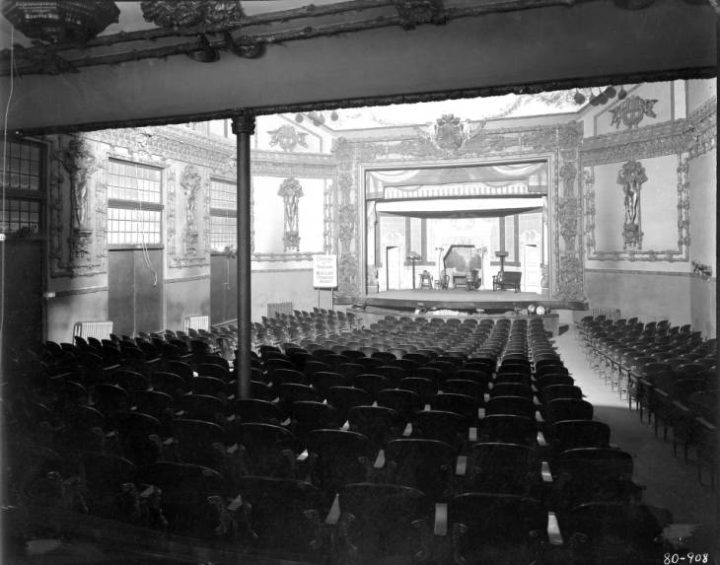When the Majestic Theater opened on the northeast corner of College and Market streets in March 1913, The Asheville Gazette-News called it “regal” and “beautiful.” Among its many decorative features were three ceiling murals representing music, comedy and love.
According to the paper, the theater could seat 800 (a generous count based on available photographs). And though the building was deemed “nearly fireproof” on account of its asbestos curtains and partitions, the venue featured 21 exit doors, which could be “thrown open instantly,” The Gazette noted, allowing a packed room to empty “in about two minutes.”
But more important than the theater’s grand appearance and its state-of-the-art features was its dire necessity. “It comes between the Auditorium and the mere moving picture and cheap vaudeville houses,” The Gazette pointed out in its March 22, 1913, edition. “It will be a sin if the character of the productions are not in some measure in keeping with the theater itself.”
Over the next seven years, live acts took the stage. But in 1921, Majestic announced plans to temporarily close to update its equipment and convert the site to a moving picture house. For some residents, including S.B. Haskell, the decision came as a welcome change.
“I would like to endorse the new policy … in discontinuing the so-called musical comedy and vaudeville,” Haskell wrote in a letter to the editor, featured in the April 29, 1921, edition of The Asheville Citizen. “I have often wondered why the ministers and good people of Asheville have not requested this before.”
According to Haskell, “The jokes and costumes [featured in live performances] have been such an order that no lady could attend.” Because of this, Haskell claimed, men accounted for 95% of Majestic’s patrons.

“I have always attended theatres regularly and enjoy good vaudeville, and trust that Asheville may receive entertainments of better order in the future,” Haskell continued. “At least I hope we may have clean shows.”
But others saw it quite differently. In a May 1, 1921, letter to the editor, Carl P. Jones, lambasted Haskell’s assessment of the theater, writing:
“He claims that the shows in the past have been of such a nature that none of the better people could attend, but I am a frequent visitor there and I am just as good as said Mr. Haskell, and as for the costumes being such that no lady should attend, that is absurd. If Mr. Haskell will take a walk up Patton avenue and across the square most any afternoon I’ll guarantee that he will see as much if not more of the feminine body exposed than at the Majestic theatre, and there are many sights seen on the streets of Asheville every day that far surpass in vulgarity anything I have ever seen or heard at the Majestic theatre.”
A week after Jones’ letter, The Sunday Citizen announced Majestic Theater’s reopening. Echoing The Gazette’s original 1913 praise of the venue, The Sunday Citizen declared “tomorrow afternoon at 1 o’clock, the people of the city will witness one of the prettiest and most modern picture houses in the south.”
In addition to its new green and white seat coverings — “which gives the interior a cool and inviting appearance,” the paper wrote — ushers donned white uniforms, creating “the appearance of a Metropolitan theater.” Meanwhile, on the technical side, two new projectors ensured “the latest methods of picture projection … giving the super-attractions the clearest possible screening.”
By 1929, the Majestic was renamed the Paramount Theatre.
Thirty years later, in 1959, the movie house closed. On Oct. 19, The Asheville Citizen remembered the Paramount “as [being] the home of many visiting vaudeville shows and was noted as one of the finest theaters in Asheville from an acoustical standpoint.”
The paper added, “It was formerly known as the Majestic Theatre.”
Today, a parking lot occupies the site where the theater once stood.
Editor’s note: Peculiarities of spelling and punctuation are preserved from the original documents.




Thanks for Mr. Calder for this interesting insight into Asheville history. And for his other history articles.